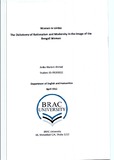| dc.contributor.advisor | Azim, Firdous | |
| dc.contributor.author | Ahmed, Anika Mariam | |
| dc.date.accessioned | 2012-07-15T08:54:23Z | |
| dc.date.available | 2012-07-15T08:54:23Z | |
| dc.date.copyright | 2012 | |
| dc.date.issued | 2012-04 | |
| dc.identifier.other | ID 09203022 | |
| dc.identifier.uri | http://hdl.handle.net/10361/1923 | |
| dc.description | This thesis is submitted in partial fulfillment of the requirements for the degree of Bachelor of Arts in English, 2012. | en_US |
| dc.description | Cataloged from PDF version of thesis. | |
| dc.description | Includes bibliographical references (page 62-65). | |
| dc.description.abstract | Nationalism is commonly interpreted as loyalty to the nation. In Bengal, one of the earliest manifestations of this phenomenon can be traced to the swadeshi or nationalist movement. Modernity, however, which was one of the pillars of the nation's advent into nationalism, was often associated with European, and thereby unpatriotic, ways creating a paradoxical situation for people involved in anti-colonial struggles.
This dissertation attempts to find the voice of the Bengali woman as she is stuck in an uncertain space - in limbo - between nationalism and modernity, between the home and the world. Her struggle is not the same as that of her fellow man who may also oscillate between the two, but is unique to her female experience in that she is made the emblem of culture and tradition and attempts at being modern on her part is somehow seen as a betrayal. The dissertation discusses why and how women are seen as more, or less, than individuals in the emerging nation, and tries to locate her actual place in the new country, beyond symbols and ideology. This thesis particularly looks at the female characters of two of the greatest writers Bengal has
ever produced, Bankim Chandra Chatterji and Rabindranath Tagore.
The dissertation concludes with a discussion on the place of women during the emergence of the newest nation that emerged in Bengal, Bangladesh. Biranganas or women raped during the Liberation War in 1971 get reduced to symbols while their place in the new country remains as shaky and unsure. Women's lives are once again controlled by ideologies and forces beyond themselves, and the limbo does not end. This discussion is primarily based on Shaheen Akhtar's novel Talaash. | en_US |
| dc.description.statementofresponsibility | Anika Mariam Ahmed | |
| dc.format.extent | 72 pages | |
| dc.language.iso | en | en_US |
| dc.publisher | BRAC University | en_US |
| dc.rights | BRAC University thesis are protected by copyright. They may be viewed from this source for any purpose, but reproduction or distribution in any format is prohibited without written permission. | |
| dc.subject | English and humanities | |
| dc.title | Women in limbo: the dichotomy of nationalism and modernity in the image of the bengali woman | en_US |
| dc.type | Thesis | en_US |
| dc.contributor.department | Department of English and Humanities, BRAC University | |
| dc.description.degree | B.A. in English | |

